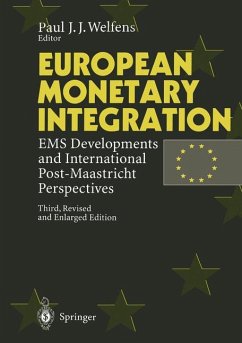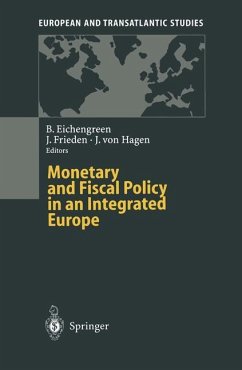
European Economic Integration as a Challenge to Industry and Government
Contemporary and Historical Perspectives on International Economic Dynamics
Herausgegeben von Tilly, Richard; Welfens, Paul J. J.

PAYBACK Punkte
39 °P sammeln!
explicit presentation of some of those stylized facts in the form of a brief, chronologically structured narrative. In keeping with the broad scope of this volume we begin by going back at least two hundred years, to the growth of an integrated national capital market in England in the 18th century (see Neal Chapter). This starting point has the advantage of calling attention to a number of important points. First, the form of integration by which a central market (London) for a standardized good (government bonds or consols) came to serve as linkage between two or more hitherto separate (regi...
explicit presentation of some of those stylized facts in the form of a brief, chronologically structured narrative. In keeping with the broad scope of this volume we begin by going back at least two hundred years, to the growth of an integrated national capital market in England in the 18th century (see Neal Chapter). This starting point has the advantage of calling attention to a number of important points. First, the form of integration by which a central market (London) for a standardized good (government bonds or consols) came to serve as linkage between two or more hitherto separate (regional) markets, represents a typical and important form of fInancial (and economic) integration. In Kindleberger's terminology it is the "integration via third parties" form (where, say, security prices in A and B converge): 2 A < -----------> C < ----------------> B instead of A < ------------> B. In the 18th-century English context this central market provided a widely available index of the opportunity costs of alternative investments, the importance of which should not be underestimated, for it contributed to national economic integration in England (NEAL, 1994). Second, this example illustrates an important point of political economy. The prerequisite for the development of the central market mentioned was the establishment of sound public fInances based on the state's widely accepted power to tax.














